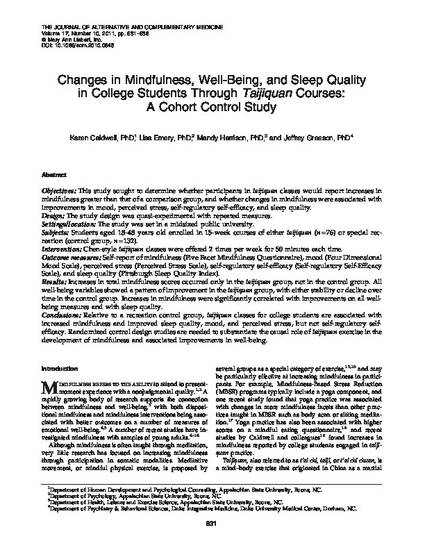
Objectives: This study sought to determine whether participants in taijiquan classes would report increases in mindfulness greater than that of a comparison group, and whether changes in mindfulness were associated with improvements in mood, perceived stress, self-regulatory self-efficacy, and sleep quality.
Design: The study design was quasi-experimental with repeated measures.
Settings/location: The study was set in a midsized public university.
Subjects: Students aged 18–48 years old enrolled in 15-week courses of either taijiquan (n = 76) or special recreation (control group, n = 132).
Intervention: Chen-style taijiquan classes were offered 2 times per week for 50 minutes each time.
Outcome measures: Self-report of mindfulness (Five Facet Mindfulness Questionnaire), mood (Four Dimensional Mood Scale), perceived stress (Perceived Stress Scale), self-regulatory self-efficacy (Self-regulatory Self-Efficacy Scale), and sleep quality (Pittsburgh Sleep Quality Index).
Results: Increases in total mindfulness scores occurred only in the taijiquan group, not in the control group. All well-being variables showed a pattern of improvement in the taijiquan group, with either stability or decline over time in the control group. Increases in mindfulness were significantly correlated with improvements on all wellbeing measures and with sleep quality.
Conclusions: Relative to a recreation control group, taijiquan classes for college students are associated with increased mindfulness and improved sleep quality, mood, and perceived stress, but not self-regulatory selfefficacy. Randomized control design studies are needed to substantiate the causal role of taijiquan exercise in the development of mindfulness and associated improvements in well-being.
Caldwell, K., Emery, L., Harrison, M., & Greeson, J. (2011). Changes in mindfulness, well-being, and sleep quality in college students through taijiquan courses: A cohort control study. The Journal of Alternative and Complementary Medicine, 17(10), 931-938.

Author manuscript from PubMed Central.
PMCID: PMC3199537